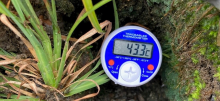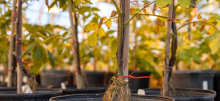
Environmental Pollution, Social Injustices and Cognitive Health
Thanks to recent funding by a Tetrad Grant, a team of MSU professors will be scientifically studying the impact of air pollution and social detriments of health on cognitive health and quality of life for older Black Americans in rural Louisiana.

Making a Splash in Water Research
Michigan State University is committed to finding solutions to modern problems that jeopardize the availability of clean, safe water for natural ecosystems and for human uses, including drinking, agriculture and so much more.

MSU Researchers Turn the Tide for Safer, Healthier Water
In a world that feels unpredictable, Michigan State University is meeting the moment by creating practical climate solutions today that will ensure a more sustainable and secure future.

Insights in Microbes Near Centralia Mine Fire that Could Help Alleviate Impacts of Climate Change
Microbes are vital to maintaining healthy, fertile soil, which, in turn, is vital to the overall health of ecosystems. But what happens to these microbes when humans cause long-term damage to the environment?

A New Tool to Fight Cancer, Infections, Addiction
A soccer ball-shaped, nanoparticle-sized vaccine delivery platform called Q-Beta might hold the key to unlocking treatments for any number of viruses and diseases — from cancers to infections and even opioid addiction — thanks to the work of a research team that got its start at Michigan State University.

MSU, PSU Redefine Gut Microbe Benefits from Bile Salts
Bile acids are linked to our full-body health, can act as drugs and are some of the best studied molecules in the history of biochemistry.

Key Mental Health Services Could Reduce Jail Time
Counties could save money and keep more people out of jail by improving access to community-based mental health and substance use disorder services, according to a study led by a Michigan State University College of Human Medicine professor.

Internationally Recognized MSU Art Faculty Explore Imagination Beyond Fantasy in Triennial Exhibition
Works from internationally recognized faculty in the Michigan State University Department of Art, Art History and Design, or AAHD, on display at the MSU Eli and Edythe Broad Art Museum as part of the department’s triennial exhibition.

Discovery Led by MSU Researchers Can Reduce Harmful Chemicals Produced in Fried Potatoes
In a breakthrough for the snack food industry, a team of scientists led by Michigan State University professors Jiming Jiang and David Douches has discovered a key mechanism behind the darkening and potential health concerns associated with cold-stored potatoes.

Illuminating the Source-Sink Balancing Act of Photosynthetic ‘Tiny Green Bacteria’
Cyanobacteria are little green microorganisms that photosynthesize, like plants and algae do, but with stark differences in how they function.
